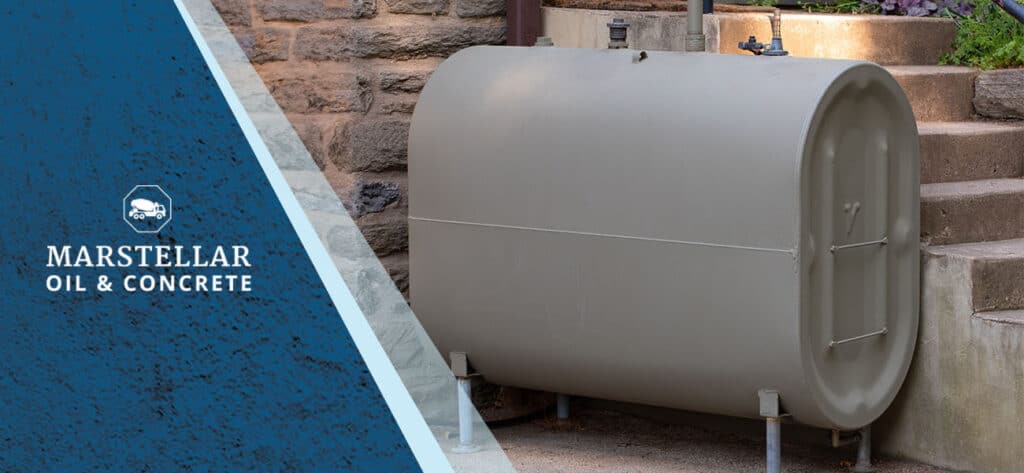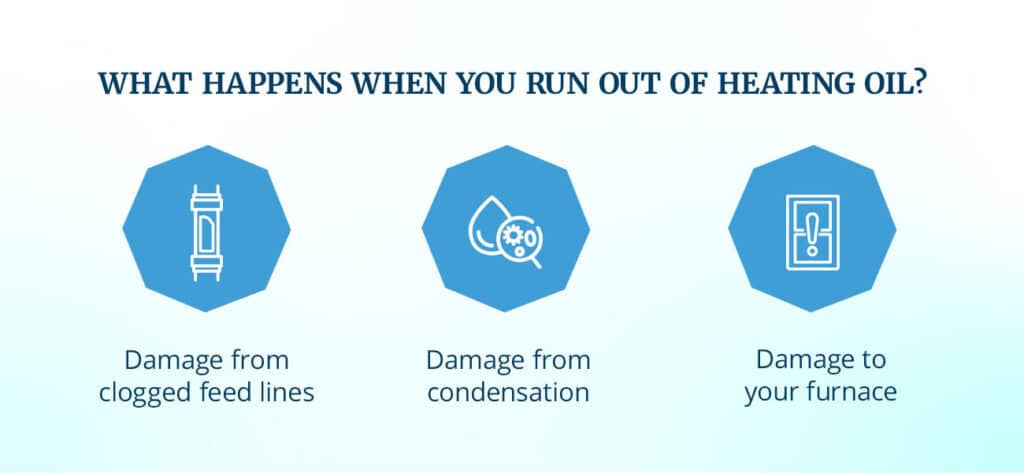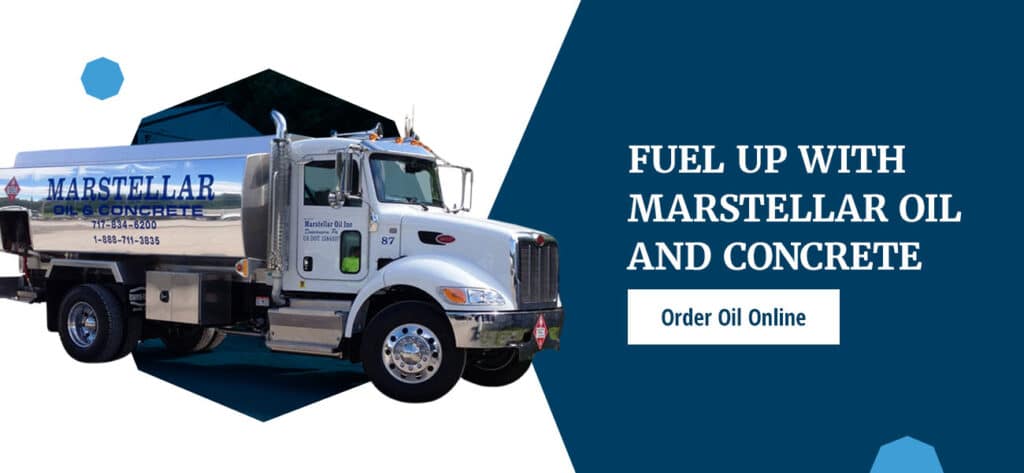
Refilling your heating oil might not be the most exciting task, but it is crucial. Even if you think you don’t need it right away, letting your oil run out can create several other problems, potentially damaging your equipment.
To help you stay on top of things, we’ll go over monitoring your tank, what happens if you run out of home heating oil and how you can prevent it from happening.
How to Check Your Home Heating Oil Levels
To keep a close eye on your home heating oil levels, check them frequently with either a fuel gauge or a dipstick. Most heating oil tanks come with a float gauge, which can give a ballpark estimate of your fuel. These gauges contain a floating disc inside a clear, marked casing. As you use fuel, the disc moves lower and aligns with a lower measurement on the casing.
If you don’t have a floating gauge or you want to verify its results, use a dipstick. Place it in the tank to see how many inches of fuel you have. Check the specifications for your tank for a chart that tells you how much fuel your measurement indicates.
Remember, both of these options measure the depth of the fuel, so you’ll still run through the last quarter of a tank more quickly.
How Low Can Heating Oil Go?
A good rule of thumb is to order more fuel when your tank reaches about a quarter or a third full. The standard home oil tank holds about 275 gallons, so this threshold gives you around 70-90 gallons. Homeowners can usually make this amount last a week or two, depending on the size of the house, heating habits and the outdoor temperature.
While a quarter tank may sound like a lot, the shape of an oil tank can be deceptive. Since oil tanks have rounded bottoms, emptying from half a tank to a quarter tank takes much longer than going from a quarter tank to zero. Even if you normally have plenty of time to use a quarter tank, you might reach empty a lot quicker than you expect, so be prompt about reordering.
Another aspect to keep in mind is your furnace’s unique shut-off level. Furnaces start their auto-shutdown before reaching zero. Some will cut off earlier than others, so check your specifications to see how much leeway you have.
What Happens When You Run Out of Heating Oil?
If you run out of heating oil, your furnace should shut off automatically to prevent significant damage. Letting your fuel go this low can cause other problems, such as:

- Damage from clogged feed lines: Sediment and impurities naturally settle at the bottom of an oil tank. When your tank is low, the feed line to your furnace is more likely to draw in these particles. They can clog filters and the nozzle to the burner, causing malfunctions and expensive repairs.
- Damage from condensation: An outdoor, above-ground tank can build up condensation on the interior walls when empty. These dark tanks are a great environment for bacterial growth, which can break down the oil and turn it into sludge. Condensation can also lead to rust formation, which can corrode the tank or mix with fuel to increase impurities.
- Damage to your furnace: Fortunately, your furnace’s shut-off mechanism should prevent serious damage if you run out of fuel once or twice, but you shouldn’t get into the habit of letting it run dry. When the nozzles and oil filters get clogged, you’ll need to bleed the fuel lines and replace the filter before you can turn your furnace back on. Otherwise, the sediment gets pulled into the furnace and can cause damage and reduce efficiency. These tasks require a service call from a technician.
While it’s inconvenient enough to go without heat or hot water until your fuel delivery date, the risks of damage to your equipment can increase the costs of running out of heating oil.
What to Do When Home Heating Oil Runs Low
Ideally, you’ll order your oil ahead of time and won’t have to stress about a low tank — but it happens to the best of us. Maybe you simply forgot, got busy or misread the gauge. Whatever the reason, quickly taking care of a low oil tank can help you prevent damage and ensure a speedy refill.
If you don’t think your tank should be empty, double-check the tank itself for any signs of a leak and inspect your furnace for damage or clogs. Consider measuring it with a dipstick to verify the gauge.
Assuming your system is working properly, verify your furnace has turned off and follow these steps when your home heating oil goes low:
- Order more fuel: First, schedule your delivery. Standard orders might take a few days, but a speedy oil provider can deliver your fuel within one to two business days. Same-day deliveries usually require an extra fee.
- Plan for cold temperatures: If you run out of fuel in the dead of winter, plan for the cold. Diesel fuel makes a good stop-gap for short-term heating. Use our guide on adding diesel to your heating oil tank and safely mixing the two. Kerosene can also work, but be careful of its flammability. Other ways to prepare for cold include layering up, grabbing wood for a fireplace or using a space heater.
- Minimize fuel use: Try to make your existing fuel last longer by keeping the thermostat low. Again, layers and other methods of keeping warm will help here. In the long term, consider improving your home’s insulation or upgrading your furnace to a more energy-efficient option to reduce your fuel consumption.
Ways to Prevent Home Heating Oil From Running Out
While those steps can help you react when your tank goes low, the easiest solution is to prevent it from happening. Here are some strategies to consider:
- Monitor your fuel level regularly: Incorporate checking your fuel gauge into regular home maintenance chores. You can even find smart gauges that send you alerts when your tank gets low.
- Buy fuel early and plan for it: If you find yourself putting off fuel orders due to high prices, try to buy early when prices are lower. Winter weather increases demand, so watching for lower prices or working with a cost-effective provider can help you save and get fuel on time. If you have trouble budgeting for home heating oil, look into your state’s assistance programs, like the Low Income Home Energy Assistance Program (LIHEAP) in Pennsylvania.
- Buy your fuel in small quantities: Some oil providers have high minimum purchase requirements, but these minimums can cause you to postpone delivery until the last second so you can get the most out of your order. Small-quantity orders offer more flexibility, so you can buy when you need to, even if it’s just to top off your tank before a big storm.
With a little planning and a good partner, you can avoid running out of oil all winter long.

Fuel Up With Marstellar Oil and Concrete
Homeowners across Central Pennsylvania trust Marstellar Oil and Concrete to keep their tanks full and their houses warm. With minimum orders of just 50 gallons, easy online ordering and fast delivery, we make it easy to refill your home heating oil. Our low same-day fee also makes emergency delivery easier on your wallet.
Contact us today to learn more, or order your oil online!

